Posted 11/12/96
Kicking the Bucket, Feist, A Free Lunch, No Bones About It, Brouhaha, Ducks and Drakes, About Last Night, On the Nose, and a Steward in the Sty.
It's what you stand on to change a light bulb.
Dear Evan: My question pertains to the origin of the saying "Kick the Bucket." A few of us in my group here at GE in Schenectady, NY regularly enjoy coming up with and finding out the meaning of different phrases and expressions used in everyday English, and this is a very common one for which we have not been successful at finding an origin. Could you please help us? -- Gary von Maucher, via the Internet.
 Y'know, I was under the impression, based on all those cheery General Electric commercials, that you folks were dedicated to "bringing good things to light." (Or is it "to life"? I could never figure that out. I guess it must be "to light" -- "to life" is a bit too reminiscent of Doctor Frankenstein, eh?) In any case, it hardly seems appropriate for you guys to be sitting around discussing slang phrases for death and dying.
Y'know, I was under the impression, based on all those cheery General Electric commercials, that you folks were dedicated to "bringing good things to light." (Or is it "to life"? I could never figure that out. I guess it must be "to light" -- "to life" is a bit too reminiscent of Doctor Frankenstein, eh?) In any case, it hardly seems appropriate for you guys to be sitting around discussing slang phrases for death and dying.
But since that's the topic du jour, you'll be glad to hear that, according to a marvelous little book called "Slang Down the Ages" by Jonathon Green, there are actually two possible origins for "kick the bucket," both suitably grisly. It seems that one method of slaughtering a pig used to involve hanging it upside down from a beam by means of a piece of wood called a "bucket." The dying animal would, naturally, "kick the bucket." The other possible origin refers to a method of hanging oneself, which involved standing on a bucket, tightening the noose, and then kicking away the bucket. Since the phrase "kick the bucket" dates back to at least the 16th century, neither of these can definitively be called the "genuine" origin, but at least you folks now have two new stories to help while away your afternoons at GE. Say, while I've got your ear, is it true that you folks have invented a perpetual light bulb that the big mucky-mucks won't let you sell because it would kill the market for replacement bulbs? Just asking.
You can usually spot them by the ears.
Dear Mr. Morris: I recently heard an elderly gentleman (from the rural South) refer to a dog I know as a "feist." He said a feist (pronounced as in "feisty") is a dog who likes to chase squirrels. I told a friend this story, and she said that she had heard the term used to refer to a dog of mixed breed. Do you know anything about this, and the derivation of the word? -- Betsy Taylor, via the Internet.
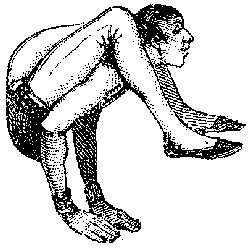
Reading your question rang a very small, distant bell somewhere way back in the cobwebbed recesses of my mind, so evidently I have heard "feist" in relation to dogs somewhere before. Columns such as this, however, are not built of small, distant bells. I am very glad, therefore, that the folks at the Dictionary of American Regional English (DARE) are on the ball. I'm even gladder, inasmuch as the DARE project is a work-in-progress and not yet complete, that your query fell within the part of the alphabet (A through H) covered in the two volumes of DARE that have already been published.
According to DARE, "feist" means "a small dog of mixed breed; a cur." "Feist" is chiefly heard in the American South, and can also be spelled "fice," "fycte," "fist," and at least a dozen other ways. "Feist" (we'll stick with the most common spelling here) is, surprisingly (to me, at least), a very old word. The first citation (for "foist") reported by DARE is from George Washington's diary in 1770 ("A small foist looking yellow cur."). Another citation, from the journal Verbatim in 1977, defines "feist" as a "noisy and contentious, dyspeptic little dog." Enthusiastic and nearly continuous barking seems to be integral to the notion of a "feist," and although squirrel-chasing is not specifically mentioned in any of DARE's citations, it would seem a logical part of any respectable feist's repertoire. The word "feist" comes, incidentally, from the archaic English word "fist," meaning "to break wind," the same root that gave us "feisty," meaning "spirited" or "plucky." There's something to consider next time you hear Ross Perot labeled "feisty."
Stranger in a strange bar.
Dear Evan: The following question recently appeared on STUMPERS-L (an Internet mailing list in which research librarians assist each other with tough ones):
I am interested in tracing the origin of the expression "There's no such thing as a free lunch." No, it didn't originate with Milton Friedman or Robert Heinlein, but rather appears to have been the punch line to an economists' joke current as early as the 1930s. Does anyone know of any evidence of usage from the 1930s or 1940s or earlier?
Can you help? -- Paul Wiener, via the Internet.
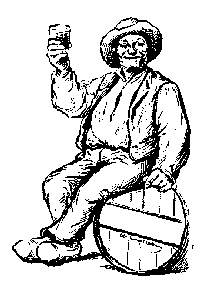
I don't know about this one. You seem to be asking me to compete with professional researchers armed with entire buildings full of books and computerized databases. I, in contrast, have to dislodge an obese orange cat to open a simple dictionary around here.
In any case, judging from the reference to Milton Friedman and Robert Heinlein, you're aware that Heinlein used the phrase in one of his science fiction novels in 1966. Economist Friedman also popularized the expression, but did not claim to have invented it. And, according to Robert Caro, quoted in the Random House Historical Dictionary of American Slang, New York Mayor Fiorello LaGuardia used the phrase (in Latin, no less) in 1934.
I don't think anyone is likely to come up with a definitive "first use" of this phrase. The institution of a "free lunch" itself dates back to the mid-19th century, when it was common for taverns to offer their paying customers free food (usually a cold buffet) along with their drinks. Since eating the "free" food required first buying a drink, however, it was debatable whether the "lunch" was really "free" in any real sense. I'd be surprised if the common-sense aphorism "there's no such thing as a free lunch" didn't arise within just a few years of the establishment of the "free lunch" practice in 19th century taverns.
Furthermore, inasmuch as....
Dear Evan: Is "moreso" a word? I can't find it in my dictionaries; my spell-checker doesn't like it, but I've been reading and hearing it everywhere recently. Two examples from the one page of the sports section: " ... and he is confident the '96 Braves, moreso than the '72 Braves will embrace a teenager." "Shrouded this time by closer Mark Wohlers' franchise-record 31st save moreso than John Smoltz's seamless season, ...." -- R. Duvall, via the Internet.

Your spell checker is not alone. I not only don't like "moreso," I don't understand why anyone would write that way. If you had supplied only one example, I'd have said that it was almost certainly a typographical error, but if "moreso" is truly suddenly commonplace, I am deeply alarmed. Mutant words seem to be springing up in the Sports Section.
I should call a time-out at this point and mention that I am absolutely, utterly sports-illiterate, and have never read the sports section of any newspaper. Ever. Really. True, I did manage the baseball, hockey and soccer teams in high school, but my duties in each case had only a marginal relationship to the particular sport per se. My primary duty to the soccer team, for instance, seemed to be to warn our coach if I spotted the Headmaster coming, so he would have time to put away his flask. My role in the grand scheme of the hockey team, on the other hand, consisted largely of driving newly-toothless players to the Emergency Room. I became awesomely proficient in filling out hospital forms and calming distraught parents.
But I digress. You say that you have been reading and hearing "moreso" everywhere. Hearing it doesn't bother me -- after all, "more so" (two words) is a perfectly respectable construction meaning "to a greater extent than." Radio and television "sportscasters" slurring the two words together doesn't surprise me. Sportswriters jamming "more" and "so" together into one word repeatedly in print, however, is a bad idea. What about its opposite construction, "less so"? Are we now to glop these together into "lesso"? Soon we'll be facing "inorderto" and "inspiteof," not to mention "nottomention." Welcome to Mars. Somebody hand me that flask.
A Chicken Runs Through It.
Dear Evan: I very much appreciate your site -- it will take me some time to read all your columns (but I will). But in the meantime, I need to find the origin of the phrase "no bones about it." Any help you can offer will be very helpful.-- Michael A. Rayl, via the Internet.
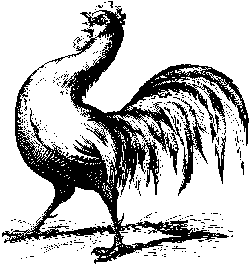 I sometimes wonder what's really going on when people write me saying they "need" an answer. Am I missing out on some lucrative wager riding on my response? Am I determining, unwittingly, the outcome of a extravagant contest, the grand prize of which is a week on the Riviera? Is this why so many of my readers send me "thank you" cards from Hawaii? How do I get in on the action?
I sometimes wonder what's really going on when people write me saying they "need" an answer. Am I missing out on some lucrative wager riding on my response? Am I determining, unwittingly, the outcome of a extravagant contest, the grand prize of which is a week on the Riviera? Is this why so many of my readers send me "thank you" cards from Hawaii? How do I get in on the action?
Oh well. Whatever the truth, I have no choice but to soldier on, so here goes. To "make no bones about it," means to do something in a straightforward or unapologetic manner -- to "just do it." According to Christine Ammer's book "Have A Nice Day -- No Problem," a dandy dictionary of cliches, "make no bones about it" is such an ancient phrase, dating to at least 1548, that its origins cannot be accurately traced. As is usual in such cases, however, there are theories. It may have originally arisen as a metaphor, referring to someone who did not make a fuss if bones turned up in his or her soup or stew. Or (there's never just one theory, you'll notice) it may be based on "bones" being a very old slang term for dice. Someone who "made no bones" would be a player who simply cast the dice when his turn came, omitting all the mystical (and annoying) little rituals (such as blowing on, or talking to, the dice) gamblers often develop to conjure up good luck in a game.
Hardeehar.
Dear Evan: The other night on TV I heard David Letterman refer to some controversy as a "great brouhaha." Is this a real word, and if so, where did it come from? -- K.W., New York, NY.
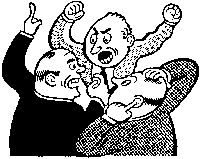 Yes, "brouhaha" is a real word, meaning "fuss," "argument" or "ruckus." "Brouhaha" comes to English directly from French, where it originally meant "noisy chattering." It is probably what linguists call an "echoic" or "imitative" word, the "haha" in particular imitating the sound of a noisy squabble. Today we use it to mean a dispute that produces more noise than substance -- a "brouhaha" rarely amounts to a serious debate or even scandal. Madonna's pathetic antics, for instance, produce one "brouhaha" after another, yet no one aside from hard-core MTV viewers pays much attention any more.
Yes, "brouhaha" is a real word, meaning "fuss," "argument" or "ruckus." "Brouhaha" comes to English directly from French, where it originally meant "noisy chattering." It is probably what linguists call an "echoic" or "imitative" word, the "haha" in particular imitating the sound of a noisy squabble. Today we use it to mean a dispute that produces more noise than substance -- a "brouhaha" rarely amounts to a serious debate or even scandal. Madonna's pathetic antics, for instance, produce one "brouhaha" after another, yet no one aside from hard-core MTV viewers pays much attention any more.
"Ruckus," by the way, is another funny-sounding word with an interesting history. It's actually a blend of two words, "rumpus" and "ruction," with very different origins. "Rumpus" was coined by 18th century German and Swiss students to describe a riot or uproar, and lives on today in our phrase "rumpus room," a place in the house where children are allowed to run wild. "Ruction" means pretty much the same thing as "rumpus," but has a somewhat grimmer origin. The original "ruction" was the Irish Insurrection of 1798, a violent agrarian rebellion. By the early 19th century, "insurrection" had been cropped to "ruction," and the word became a popular synonym for any violent and destructive quarrel or disturbance. As "rumpus" and "ruction" came to be combined in common usage, the cheerier tone of "rumpus" overcame the grim legacy of "ruction," and a "ruckus" today is little more than a "brouhaha" -- much ado about nearly nothing.
And the big orange one keeps sinking.
Dear Evan: Someone on television said recently that our local state senator had been "playing ducks and drakes" with the taxpayers' money. I gather he meant our elected representative was less than fiscally prudent, but where do ducks and drakes come in? -- Katherine Mercurio, New York City.
You know, I realized just the other day that I've always wanted a pet duck. Some of my fondest childhood memories are of feeding the ducks in the park on a Sunday afternoon. I've tried to train my cats to swim in circles and quack, but it's just not the same.
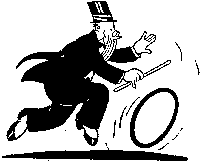 It pains me to subject noble waterfowl to even metaphorical association with politicians, but here goes. "Ducks and Drakes" is one name for a children's game perhaps more popular in the days before television, when more children played outdoors. It's also called "skipping stones," and requires a pond or lake, a supply of small flat stones and a strong throwing arm. The object is to throw the stones at a low angle to the water's surface so that they "skip" across the water, the more skips the better. In "ducks and drakes," the first skip is called a duck, the next a drake, then duck, then drake and so on, "drake" being, of course, a male duck. The winner is the child who makes the most skips with one throw. The game itself is probably prehistoric in origin, and the name "ducks and drakes" dates back to at least the 16th century. It's a pleasant child's game, but clearly anyone who plays "ducks and drakes" with money is squandering it in the most pointless fashion imaginable -- thus the metaphor, which is almost as old as the game.
It pains me to subject noble waterfowl to even metaphorical association with politicians, but here goes. "Ducks and Drakes" is one name for a children's game perhaps more popular in the days before television, when more children played outdoors. It's also called "skipping stones," and requires a pond or lake, a supply of small flat stones and a strong throwing arm. The object is to throw the stones at a low angle to the water's surface so that they "skip" across the water, the more skips the better. In "ducks and drakes," the first skip is called a duck, the next a drake, then duck, then drake and so on, "drake" being, of course, a male duck. The winner is the child who makes the most skips with one throw. The game itself is probably prehistoric in origin, and the name "ducks and drakes" dates back to at least the 16th century. It's a pleasant child's game, but clearly anyone who plays "ducks and drakes" with money is squandering it in the most pointless fashion imaginable -- thus the metaphor, which is almost as old as the game.
Speaking of ducks, our everyday speech contains many "ducks." We "duck under" an awning to avoid a sudden shower or we "duck" an invitation to a boring party. These "ducks" come from the same root that gave the feathered duck its name, the Old English word "ducan," meaning "to dive." So when we shout "duck!", we are not ordering anyone to waddle and quack, but warning them to dive to avoid harm.
Nightynight.
Dear Evan: This is the perfect opportunity to ask a question that's been on my mind for a while. What's odd about the word "night"? Why does "good night" always mean goodbye, while good morning, good afternoon, good day can also mean hello? Why can we say yesterday morning, yesterday afternoon, yesterday evening, tomorrow morning, tomorrow afternoon, tomorrow evening, tomorrow night, but NOT yesterday night? -- Reed Cooper, via the Internet.
Well, first things first. You can say anything you darn well please. If you want to say "yesterday night" in public, go right ahead. If you feel the urge to greet your friends by saying "good night," be my guest. And if you notice your friends looking alarmed and backing away slowly, ignore them. They are just being hopelessly hidebound and unimaginative and probably don't believe in cold fusion, either.
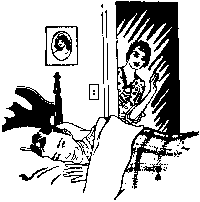
There's nothing particularly odd about the word "night" in the constructions you mention. There is no underlying logical rule at work here. What you've noticed is simply the awesome role of idioms in the English language -- we say things certain ways for no other reason than that we, well, say things that way. Speaking of how we say things, I must take exception to your roster of permissible locutions -- many people do, in fact, say "last evening" as well as "last night." The construction "yesterday evening" sounds a bit odd to me, in fact.
"Night" is, incidentally, an interesting word all by itself. The root of "night" was an ancient Indo-European word something like "nokt," and the family resemblance among words for "night" is very apparent in almost all modern European languages. Thus, we had "nux" (Greek) and "nox" (Latin), and today we have "nuit" (French), "notte" (Italian), "noche" (Spanish), "noch" (Russian), "nacht" (German and Dutch), and "natt" (Swedish), among others. The only major language that seems to have opted out of this "night game" is Irish, where "night" is "oidhche," a word that, in typically stubborn Irish fashion, has kept its origins a mystery.
Nose News.
Dear Evan: What can you tell me about the phrase "on the nose"? I assume that it comes from the world of horse racing, and that it refers to gamblers putting a bet "on the horse's nose," since that is the first part of the horse to cross the finish line. But how did it come to mean "precisely" or "on time," as in "We'll meet at eight o'clock on the nose." -- Susan Davis, New York City.

Before we start, I must make yet another of those mildly humiliating admissions to which regular readers of this column have become accustomed. That's right, in addition to never having owned a single share of stock in anything, not speaking a word of French, and being violently apathetic on the subject of sports, I have never bet on a horse in my life. Furthermore, I don't plan to -- just walking past the Off-Track Betting (OTB) parlors in New York City is the most powerful aversion therapy in the world for any prospective gambler. Dante missed out on a whole ring of torment by not living to see these filthy and depressing dumps -- just imagine Hogarth's "Gin Lane" with fluorescent lighting and you've got the picture.
All of which has nothing to do with "on the nose," but that's OK because I don't think "on the nose" actually has anything to do with horse racing. The human nose appears in many slang phrases symbolizing something very close, intimate or obvious -- think of "right under your nose," "counting noses," "nose to nose" or "poke your nose into." The nose is the center of the human face, after all, so it's not surprising that it should serve as "ground zero" for so many metaphors.
Several books on word and phrase origins, by the way, trace "on the nose" to the early days of radio broadcasting. The theory is that it came from the engineer in the studio control room placing a finger alongside his nose as a signal to the announcer that the program was running precisely on schedule. I think, however, that the engineer was, more than likely, simply pantomiming the phrase "on the nose," which already existed.
I Sty.
Dear Evan: While putting together a talk on stewardship for my church recently, I stumbled upon what I believe to be the etymology of the word "steward." Its first syllable seems to derive from an Anglo-Saxon word that is represented in modern English by our word "sty," as in "This bedroom looks like a pig sty." Is this correct ? -- Michael Murley, via the Internet.
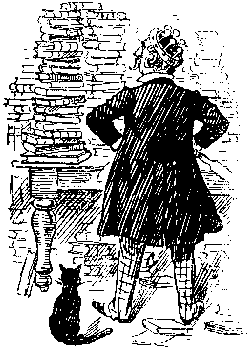
That's a very interesting question, and please bear with me as I take a somewhat oblique tack in answering it. I think that there must be, buried somewhere in the genetic stew of all human beings, a gene for rebelliousness. Something in all of us loves to see the mighty brought low. The possibility that a word ("steward") denoting qualities of responsibility, probity, sobriety and good judgment might have its roots in a raucous, filthy pig sty piques our interest because it offers the same sort of thrill we get from seeing a pompous politician slip on a banana peel, whether real or figurative. I am not, by the way, even remotely related to Dick Morris.
I mention our collective fondness for this game of linguistic "gotcha" because you are not the first person to notice the amusing convergence of "steward" and "sty." At first glance, the connection seems inarguable -- "steward" comes from the Old English "stiweard," which is a combination of "sti" or "stig," meaning "sty," and "weard," meaning "keeper" or "ward." Certainly seems to add up to "guy in charge of the pigsty," doesn't it? But the Oxford English Dictionary takes a rather stern tone in dismissing that notion: "...there is no ground for the assumption that 'steward' originally meant 'keeper of the pig sties.'" Underlying the OED's grumpy certainty is the fact that "stig" or "sti" also meant "hall" in Old English. The "stiweard" in those days was the man in charge of running the household affairs of the nobility, a sort of general manager of the manor or castle, and a very powerful man. Thus, a "steward" may or may not live up to his or her responsibilities in a given case, but the word itself is above reproach.
Take me back to the main Word Detective page.
Take me to the Index of back columns.
 Y'know, I was under the impression, based on all those cheery General Electric commercials, that you folks were dedicated to "bringing good things to light." (Or is it "to life"? I could never figure that out. I guess it must be "to light" -- "to life" is a bit too reminiscent of Doctor Frankenstein, eh?) In any case, it hardly seems appropriate for you guys to be sitting around discussing slang phrases for death and dying.
Y'know, I was under the impression, based on all those cheery General Electric commercials, that you folks were dedicated to "bringing good things to light." (Or is it "to life"? I could never figure that out. I guess it must be "to light" -- "to life" is a bit too reminiscent of Doctor Frankenstein, eh?) In any case, it hardly seems appropriate for you guys to be sitting around discussing slang phrases for death and dying.



 I sometimes wonder what's really going on when people write me saying they "need" an answer. Am I missing out on some lucrative wager riding on my response? Am I determining, unwittingly, the outcome of a extravagant contest, the grand prize of which is a week on the Riviera? Is this why so many of my readers send me "thank you" cards from Hawaii? How do I get in on the action?
I sometimes wonder what's really going on when people write me saying they "need" an answer. Am I missing out on some lucrative wager riding on my response? Am I determining, unwittingly, the outcome of a extravagant contest, the grand prize of which is a week on the Riviera? Is this why so many of my readers send me "thank you" cards from Hawaii? How do I get in on the action?
 Yes, "brouhaha" is a real word, meaning "fuss," "argument" or "ruckus." "Brouhaha" comes to English directly from French, where it originally meant "noisy chattering." It is probably what linguists call an "echoic" or "imitative" word, the "haha" in particular imitating the sound of a noisy squabble. Today we use it to mean a dispute that produces more noise than substance -- a "brouhaha" rarely amounts to a serious debate or even scandal. Madonna's pathetic antics, for instance, produce one "brouhaha" after another, yet no one aside from hard-core MTV viewers pays much attention any more.
Yes, "brouhaha" is a real word, meaning "fuss," "argument" or "ruckus." "Brouhaha" comes to English directly from French, where it originally meant "noisy chattering." It is probably what linguists call an "echoic" or "imitative" word, the "haha" in particular imitating the sound of a noisy squabble. Today we use it to mean a dispute that produces more noise than substance -- a "brouhaha" rarely amounts to a serious debate or even scandal. Madonna's pathetic antics, for instance, produce one "brouhaha" after another, yet no one aside from hard-core MTV viewers pays much attention any more.
 It pains me to subject noble waterfowl to even metaphorical association with politicians, but here goes. "Ducks and Drakes" is one name for a children's game perhaps more popular in the days before television, when more children played outdoors. It's also called "skipping stones," and requires a pond or lake, a supply of small flat stones and a strong throwing arm. The object is to throw the stones at a low angle to the water's surface so that they "skip" across the water, the more skips the better. In "ducks and drakes," the first skip is called a duck, the next a drake, then duck, then drake and so on, "drake" being, of course, a male duck. The winner is the child who makes the most skips with one throw. The game itself is probably prehistoric in origin, and the name "ducks and drakes" dates back to at least the 16th century. It's a pleasant child's game, but clearly anyone who plays "ducks and drakes" with money is squandering it in the most pointless fashion imaginable -- thus the metaphor, which is almost as old as the game.
It pains me to subject noble waterfowl to even metaphorical association with politicians, but here goes. "Ducks and Drakes" is one name for a children's game perhaps more popular in the days before television, when more children played outdoors. It's also called "skipping stones," and requires a pond or lake, a supply of small flat stones and a strong throwing arm. The object is to throw the stones at a low angle to the water's surface so that they "skip" across the water, the more skips the better. In "ducks and drakes," the first skip is called a duck, the next a drake, then duck, then drake and so on, "drake" being, of course, a male duck. The winner is the child who makes the most skips with one throw. The game itself is probably prehistoric in origin, and the name "ducks and drakes" dates back to at least the 16th century. It's a pleasant child's game, but clearly anyone who plays "ducks and drakes" with money is squandering it in the most pointless fashion imaginable -- thus the metaphor, which is almost as old as the game.


